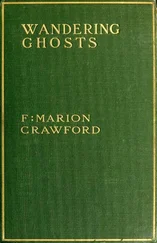F. Crawford - Via Crucis
Здесь есть возможность читать онлайн «F. Crawford - Via Crucis» весь текст электронной книги совершенно бесплатно (целиком полную версию без сокращений). В некоторых случаях можно слушать аудио, скачать через торрент в формате fb2 и присутствует краткое содержание. Жанр: Исторические приключения, на английском языке. Описание произведения, (предисловие) а так же отзывы посетителей доступны на портале библиотеки ЛибКат.
- Название:Via Crucis
- Автор:
- Жанр:
- Год:неизвестен
- ISBN:нет данных
- Рейтинг книги:3 / 5. Голосов: 1
-
Избранное:Добавить в избранное
- Отзывы:
-
Ваша оценка:
- 60
- 1
- 2
- 3
- 4
- 5
Via Crucis: краткое содержание, описание и аннотация
Предлагаем к чтению аннотацию, описание, краткое содержание или предисловие (зависит от того, что написал сам автор книги «Via Crucis»). Если вы не нашли необходимую информацию о книге — напишите в комментариях, мы постараемся отыскать её.
Via Crucis — читать онлайн бесплатно полную книгу (весь текст) целиком
Ниже представлен текст книги, разбитый по страницам. Система сохранения места последней прочитанной страницы, позволяет с удобством читать онлайн бесплатно книгу «Via Crucis», без необходимости каждый раз заново искать на чём Вы остановились. Поставьте закладку, и сможете в любой момент перейти на страницу, на которой закончили чтение.
Интервал:
Закладка:
"The Wrath of God! The White Fiend!"
For they were caught in their own trap, and death rose in their eyes. On the low heights above the gorge a thousand Christians had formed in ranks quickly, with lance lowered and sword loose in sheath. A moment later, and a steel cap went whirling through the air, glancing and gleaming in the sun, till it fell among the enemy below, and then came the sharp command, the leader's single word:
"Charge!"
The Seljuks heard the terrible, quick clanking of armour as the great troop began to move, and the Guide of Aquitaine swept down in a storm of steel, bareheaded, his fair hair streaming on the wind, his eyes on fire in the setting sun, his great sword high in air, the smile of destruction on his even lips.
"The White Fiend! The Wrath of God!" screamed the Seljuks.
They tried to fly, but there was no way out, for the pass was choked with dead below, and they must win or die, every living soul of their host. So they turned at bay, joining their strength, and standing as they could on heaps of dead bodies.
There, where they had slain, Gilbert slew them, and a thousand blades flashed red in the red sunlight, in time with his; and there was a low, sure sound of killing as steel went through flesh and bone and was wrenched back to strike again. The Seljuks fought like madmen and like wild beasts while they could; but in Gilbert's eyes there was the awful light of victory, and his arm tired not, while rank upon rank the enemy went down, and the Christians who still lived began to smite them from behind. Then the pass was filled fuller than before, and a small red river leaped down from stone to stone, following the channel to the broad valley beyond, where nearly fifty thousand powerless men watched it flowing among them. But they listened, too, and the Seljuk yell grew fainter, because few were left, and there were few to cry out.
The shout of triumphant Christian men came ringing down the evening air instead, and fear gave way to rejoicing and gladness; for though there were many dead in the upper valley, and many strong knights and men-at— arms, young and old, great and small, lay under the dead Seljuks who had killed them, yet the great body of the army was alive, the strength of the enemy was broken, and Gilbert had saved the King. In truth, he had found him in an evil case, with his back against the oak tree, and his knights dead around him; three of the last Seljuks who lived were still hacking at him with their crooked swords, while he sang his "De profundis," for his soul's good, and used his best fence for his body's safety, hewing away like a strong man and brave, as he was, notwithstanding his faults; and he was sore spent.
"Sir," he said, taking Gilbert's hand, "ask what you will of me, and if it be no sin, you shall have it, for you have saved the army of the Cross."
But the Englishman smiled and would ask nothing, for he had honour enough that day. Yet he knew not that on the cliff whence he had descended to the valley, there sat two women who dearly loved him, watching him from first to last, — the Queen and Beatrix.
There they sat, unconsciously clasping hand in hand, and their eyes were wide with fear for him, and yet bright with pride of him as they saw the splendour of his deeds, how his fair streaming hair went ever forward through the Seljuk ranks, and how his track was deep and red for others to follow, till it seemed not possible that one man could slay so many and be unhurt, and a sort of awe came over them, as if he were a being beyond nature.
Neither spoke, nor did either hand loosen on the other; but when it was done, and they saw him dismount, and stand a little apart from other men, resting on his sword, with the glory of the sunset in his face as he looked down the valley, then Beatrix turned to the Queen, and the tears of joy sprang to her eyes as she buried her girl's face in Eleanor's bosom, and she was glad of the kind arms that held her, seeming to understand all her joy. But the Queen's eyes were dry, her face was white, and her beautiful coral lips were parched as in a fever.
Chapter XXIII
In this way it came about that Gilbert, of whom the historians say that nothing else is known, was placed in command of the whole army of Crusaders, to lead them through the enemy's country down into Syria; and so he did, well and bravely. After the great battle in the valley there was much fighting still to be done, day by day; for the Seljuks retreated foot by foot, filling the mountains and sweeping down like storm-clouds, to disappear as quickly, leaving blood behind them. But Gilbert led the van, and held the whole pilgrimage together, commanding where the camp should be each night, and ordering the march. Men wondered at his wisdom, and at his strength to endure hardship; for all were very tired, and provision was scarce, and the Greek hill people sold at a tenfold value the little they had to sell, so that the soldiers dined not every day, and a dish of boiled goat's flesh was a feast. So the pilgrimage went on in fighting and suffering, and as time passed the people were the more in earnest with themselves and with one another, looking forward to the promised forgiveness of sins when they should have accomplished their vows in the holy places.
They came down at last from the mountains to the sea, to a place called Attalia. Thence Gilbert would have led them still by land into Syria; but the King was weary, and the Queen also had seen the great mistake she had made in bringing her ladies into the pilgrimage; for few had the strength of the hardy Anne of Auch, or the spirit of Beatrix, to endure without murmuring, like men, and like very brave men. The ladies' train had become a company of complainers, murmuring against everything, longing for the good things of France, and often crying out bitterly, even with tears, that they had been brought out to waste their youth and freshness, or even their lives, in a wilderness. Therefore Eleanor consented at last to the King's desire, which was to take ship from Attalia to Saint Simeon's Harbour, which is close to Antioch. In Antioch also reigned her uncle, Count Raymond, a man of her own blood, and thinking as she thought; him she now desired to see and consult with, because he knew the world, and was an honourable man, and of good counsel. Yet there was danger there, too, for the King had once believed that this Count Raymond loved her, when he had been at the court, and the King was ever very jealous and sour.
He would have brought the whole army to Antioch with him, but a great outcry arose; for, whereas all the great barons and knights were for the safer journey, the poorer sort of pilgrims feared the sea more than they feared the Seljuks, and they would not take ship. So at last the King let them go, and they, not knowing whither they went, boasted that they should reach Antioch first. He gave them money and certain guides whom he trusted.
Then Gilbert, seeing that there was a choice of two ways, sat down at night and debated what he should do. He desired to follow Beatrix with the ships, for he had not seen Sir Arnold de Curboil since Christmas Eve, and he believed that he had gone back to Ephesus to sail for Syria, so that at the present time he could not suddenly surprise his daughter and carry her away, to force her to a marriage of which heirs might be born to his great possessions in England. Gilbert knew also that his command over the whole army was ended, that the enemy's country was now passed, and that all were to join forces with Count Raymond to win back Edessa in the spring. He should therefore have more time and leisure to protect Beatrix if needful; and this was a strong thing to move him, for he had seen her many times of late, and he loved her with all his heart.
But on the other hand, when he saw how many thousands of the poorer people, who had taken the Cross in simple faith that God would provide for the journey, were about to go up into the passes again, to fight their own way through, without King or Queen or army, his charity bade him stay with them and lead them, as he only could, to live or die with them, rather than to go safely by water. So it was hard to decide which he should do, and he would not see Beatrix, lest she should persuade him; nor would he let himself think too much of the people, nor mix with them, for they knew him, and honoured him greatly, and would have carried him on their shoulders to make him their leader if he would. Therefore his debating with himself came to nothing, and he slept ill.
Читать дальшеИнтервал:
Закладка:
Похожие книги на «Via Crucis»
Представляем Вашему вниманию похожие книги на «Via Crucis» списком для выбора. Мы отобрали схожую по названию и смыслу литературу в надежде предоставить читателям больше вариантов отыскать новые, интересные, ещё непрочитанные произведения.
Обсуждение, отзывы о книге «Via Crucis» и просто собственные мнения читателей. Оставьте ваши комментарии, напишите, что Вы думаете о произведении, его смысле или главных героях. Укажите что конкретно понравилось, а что нет, и почему Вы так считаете.










